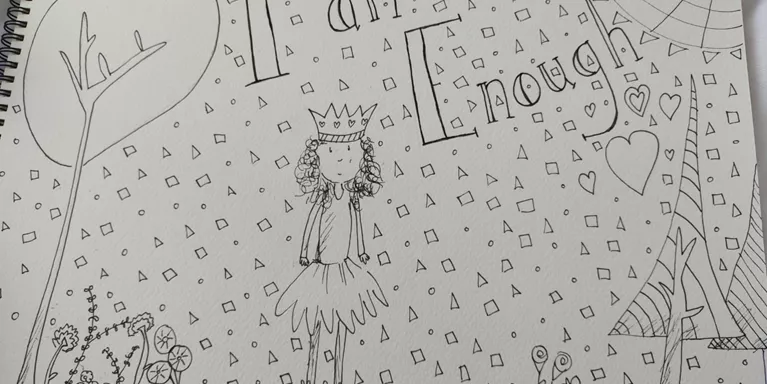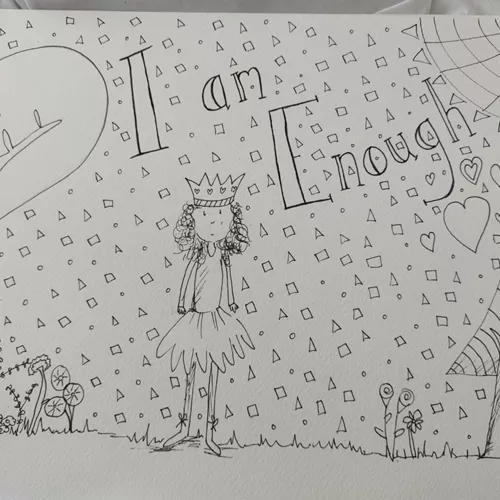Coping with mental health problems during coronavirus
This page explains some common experiences of mental health problems during the coronavirus (Covid-19) pandemic, and has tips for living with mental health problems during the pandemic.
Many of us are worried about the coronavirus pandemic and how it’s affecting our mental wellbeing. For those of us experiencing mental health problems, things may feel especially difficult. These may be problems that you’ve experienced before, or for the first time during the pandemic.
This information is to help you cope if:
- you are experiencing mental health problems during the coronavirus pandemic
- your usual ways of coping and supporting your mental health have been affected by the pandemic.
It covers:
Experiences of mental health problems during coronavirus
Many of us are struggling with our mental health during the coronavirus pandemic. You may have experienced mental health problems before the pandemic, and now you’re finding things harder to cope with. Or you may be experiencing mental health problems for the first time.
Your experience of mental health will be personal to you, and there are many different ways in which it may be affected during the pandemic.
These are some of the common experiences of how our mental health is being affected during this time:
If you experienced anxiety before the coronavirus pandemic, your feelings may have got worse. Or you may be experiencing anxiety for the first time.
Anxiety feels different for everybody, but there are some common experiences. These may include:
- feeling tense, nervous or having a sense of dread about things, such as leaving the house or coming into contact with people who may have coronavirus
- wanting lots of reassurance from people
- having panic attacks, for example if the support that used to help you cope is no longer available
- depersonalisation, which means feeling disconnected from your mind or body, or like you're watching someone else (this is a type of dissociation).
You may also experience sensations in the body, such as aches and pains, sweating and hot flushes, and a faster heartbeat. Some of these sensations may feel similar to the symptoms of coronavirus. If you’re concerned about what you’re experiencing, you can talk to your GP, call 111 or visit the NHS 111 (England) or NHS 111 Wales website.
You may feel like you have less access to support and ways of coping during coronavirus. But there are still some things you can do to manage your mental health.
See our tips for taking care of your mental health during coronavirus for ideas which may help. Or see our pages on anxiety and panic attacks for more information and ways to help yourself.
During the coronavirus pandemic, you may find that you’re experiencing stronger feelings of depression.
This may happen for a few different reasons, such as if you:
- feel more isolated, if you can’t see people face-to-face or only feel comfortable meeting them for limited contact
- find that your usual routines have had to change. This could mean you feel restless, bored or have difficulty sleeping, or feel more tired and sleep for longer than you'd like
- find it difficult to take pleasure in life, especially if you can’t do some of the activities you enjoy
- feel down, upset or tearful, for example if you’re worried about the future, or if you’ve experienced a stressful event like a bereavement or losing your job
- feel a sense of unreality, especially if your life has changed significantly during the pandemic
- feel hopeless or despairing about coronavirus.
If you are experiencing depression during the pandemic, our tips for taking care of your mental health during coronavirus may help. Or see our pages on depression for more information and ways to help yourself.
“I keep trying to be optimistic about the light at the end of the virus tunnel, but it seems to be a long way off and my personal life, what there is of it, is on long-term hold.”
During the coronavirus pandemic, it may feel difficult to live with an eating problem for a few different reasons.
For example, you might:
- feel isolated, especially if face-to-face contact usually helps you cope with difficult feelings and behaviours to do with eating
- experience anxiety about food shopping. You may be worried about whether the foods you normally eat will be available, or you may find going to the supermarket stressful if you feel uncomfortable around people you don't know
- feel overwhelmed by an increase in news stories and conversations about food and exercise
- use food or exercise as a way of feeling more in control. This may be because you’re anxious about catching coronavirus, or you feel bored or restless because of changes to your routine.
You may feel like you have less access to support and ways of coping during coronavirus. But there are still some things you can do to manage your mental health:
- The charity Beat has information about eating disorders during coronavirus, and offers support through its helpline, web chat and online support groups. This includes online community The Sanctuary, which has been created for people to discuss coping with eating disorders during coronavirus.
- See our tips for taking care of your mental health during coronavirus for some ideas which may help.
- Our pages on eating problems have more information and ways to help yourself.
Those of us who experience obsessive-compulsive disorder (OCD) may find things more difficult during the coronavirus pandemic.
This may be because of increased levels of stress and anxiety making existing obsessions and compulsions more severe. It might also be because of obsessions and compulsions specifically to do with coronavirus, such as:
- obsessions about you or someone you know becoming unwell
- compulsions about cleanliness, such as washing and checking your hands, body or things around you a lot. Government guidance about hand washing might make this feel especially difficult
- compulsions about accessing news and information about coronavirus
- compulsions about wanting lots of reassurance from people.
These pages have ideas to help you to manage your mental health:
- OCD UK has lots of helpful information on managing and living with OCD.
- This includes tips for living with OCD during the pandemic.
- Our pages on OCD have more information and ways to help yourself.
“My initial reaction was fear, anxiety and uncertainty, which caused a recurrence of previous problems relating to excessive cleaning behaviours… which had been resolved for 20 years.”
A personality disorder is a term that some people use to describe a collection of different feelings and behaviours that cause you problems in daily life.
There are a wide range of experiences associated with different types of personality disorder, some of which may feel especially difficult to cope with during coronavirus. For example, you may:
- feel very worried about people abandoning you, especially if you are finding it difficult to see people you normally would
- put yourself in dangerous or risky situations, often without thinking about the consequences for yourself or other people
- feel very anxious and paranoid when you have to leave your home to interact with others
- find it hard to confide in or trust other people, such as friends and family or people in authority
- find it difficult to form close relationships with others
- have very intense emotions that can change quickly, especially if this makes it difficult to seek treatment and support.
- experience self-harm or suicidal feelings.
You may be experiencing some of these for the first time during coronavirus. Or you may have experienced them in the past, and might have been given a diagnosis of a personality disorder by a mental health professional.
Whatever your experience, these feelings and behaviours are very difficult to cope with. Remember that you deserve understanding and support for your mental health, including if you find the term ‘personality disorder’ controversial or disagree with your diagnosis.
You may also feel like you have less access to support and ways of coping during coronavirus. But there are still some things you can do to manage your mental health.
See our tips for taking care of your mental health during coronavirus for ideas which may help. Or see our pages on personality disorders for more information and ways to help yourself.
“The important thing to remember is that we're not broken, we just think differently and experience the world in a different way... there's no shame in doing whatever we need to do to cope with our emotions in a safe and supportive way.”
If you live with bipolar disorder, it may feel especially difficult to cope during the coronavirus pandemic. This could be because of changes to your life affecting your mood, for example:
- changes to your routine, such as being at home more or having less regular contact with others
- having difficulty sleeping
- stress, anxiety or panic about the pandemic.
These may cause you to feel ‘high’ (mania or hypomania) or ‘low’ (depression), and to experience overwhelming swings in your mood.
If you are experiencing bipolar disorder during the pandemic, our tips for taking care of your mental health during coronavirus may help. This includes ways to think about your routine and keep a mood diary.
Or see our pages on bipolar disorder for more information and ways to help yourself.
Read Becky's story about living with bipolar disorder during lockdown.
If you experience post-traumatic stress disorder (PTSD), things may feel especially difficult during the coronavirus pandemic. This may be because you feel:
- isolated and abandoned, for example if you are finding it difficult to see people you normally would
- stressed, unsafe or on edge, for example if you’re worried about you or someone you know becoming unwell. This might cause you to experience flashbacks or dissociation
- claustrophobic or trapped if you are spending a lot of time at home. This could also make it difficult to avoid reminders of the trauma you’ve experienced.
You may also experience sensations in the body, such as aches and pains, sweating and hot flushes, and a faster heartbeat. Some of these sensations may feel similar to the symptoms of coronavirus. If you’re concerned about what you’re experiencing, you can talk to your GP, call 111 or visit the NHS 111 (England) or NHS 111 Wales website.
If you are experiencing PTSD during the pandemic, our tips for taking care of your mental health during coronavirus may help. This includes tips for coping if you’re experiencing flashbacks or feeling trapped, and information on how to plan for having a mental health crisis.
Or see our pages on PTSD for more information and ways to help yourself.
If you experience psychosis, you are likely to have symptoms like hallucinations, delusions and disorganised thinking and speech.
During the coronavirus pandemic, you may feel more stressed and worried about things than you used to. These changes may affect your experiences of psychosis. For example, you might:
- experience hallucinations or delusions about things related to coronavirus
- experience psychotic symptoms more often
- struggle to work out what is real and what isn’t, for example if you have previously experienced delusions about illness or infection
- experience heightened stress, if the people you live with aren’t supportive or understanding.
These symptoms may feel very difficult to live with. But there are still some things you can try to manage how you are feeling:
- See our tips for taking care of your mental health during coronavirus for ideas which may help, including information on how to plan for a crisis.
- The Hearing Voices Network has tips for getting help and support for hearing voices.
- See our pages on psychosis for more information and ways to help yourself.
If you're struggling with certain mental health problems, you might use self-harm to cope with difficult feelings.
Or if you're feeling very low and hopeless, you might find yourself experiencing suicidal thoughts.
If you think you might attempt suicide or you have seriously harmed yourself, this is a mental health emergency.
If you had ways of coping with self-harm or suicidal thoughts that aren't possible during coronavirus, our tips for taking care of your mental health during coronavirus may help.
Or see our pages on self-harm and suicidal feelings for more information.

Coping with complex PTSD in the pandemic
“During lockdown [my usual] mindfulness practices are not accessible for me... so I've needed to be more imaginative.”
If you’re experiencing difficult feelings or behaviours to do with washing or hygiene, here are some things you could try:
- Don't keep re-reading the same advice about washing your hands, if you don’t find this helpful.
- Let other people know you're struggling, and how they can help. For example, you could ask them not to remind you to wash your hands.
- Set limits, like washing your hands for the recommended 20 seconds.
- Plan something to do after washing your hands. This could help distract you and change your focus.
Flashbacks can be very distressing, but there are things you can do that might help:
- Focus on breathing in and out slowly, while counting to five.
- Look at or touch an object that reminds you of the present.
- Comfort yourself, for example by curling up in a blanket or listening to soothing music.
- Use grounding techniques to keep yourself connected to the present. This could be describing your surroundings out loud or counting objects of a particular type or colour. See our page on self-care for dissociative disorders for more information on grounding techniques.
- Consider planning a 'safe space' in your home that you can go to when you experience a flashback, if this is possible where you live.
These are some ideas you could try if you’re feeling claustrophobic or trapped:
- Open the windows to let in fresh air. Or you could spend time sitting on your doorstep, in the garden if you have one, or a local park if the restrictions in your area allow it.
- Try looking at the sky out of the window or from your doorstep. This can help to give you a sense of space.
- Regularly change the rooms you spend time in.
A safety plan is a plan to support you at times when you’re having a mental health crisis. It is personal to your needs, but may include:
- how to recognise any warning signs that you’re having a mental health crisis
- things that have helped you cope in the past, and what you can do to help yourself now
- the names and contact details of anyone who can help, including friends, family and mental health professionals
- any helplines and listening services who can help you in a crisis
- steps you can take to make your immediate environment safe.
It might feel difficult to plan for something you hope won’t happen. But creating a safety plan could help you get the support you need.
See our pages on crisis services for more information about planning for a mental health crisis, including writing a safety plan.
- It might feel hard to talk about how you are feeling, but many people find that just sharing their experiences can help them feel better.
- Talking to people you trust face-to-face may be difficult during coronavirus. You could try using phone or video chats instead.
- As well as listening to how you're feeling, the people you speak to may be able to help you think of new ideas for coping or ways of distracting yourself. This may help if you used to have coping strategies which are no longer possible during the pandemic.
“I've been honest with the people who love me about my suicidal feelings and low mood, and this has meant they know what's wrong and have context when they support me.”
- If any activities you enjoy aren’t possible right now, try to plan a new routine of enjoyable things that you can still do. For example, you could make time to read a book, listen to some music or have a regular call with someone.
- Try to set yourself goals that feel achievable to you, such as getting dressed each day or contacting someone regularly, whether that be a friend, a helpline, or an online peer support community. Achieving these things can help you feel good and boost your self-confidence. It could also help you move on to bigger goals, such as starting a new hobby or learning something new.
- You could share your plans with someone you trust so they can help you get used to your new routine.
“[I] try and keep a fairly normal routine and try to relax. I find closing my eyes and picturing being somewhere nice helps especially with the right music. I have someone I can ring when I get down and it helps me realise I'm not on my own.”
- Try to establish a routine around bed time, to help set a regular sleeping pattern. See our pages on sleep problems for tips to help.
- Try to eat regularly and drink plenty of water, if possible. See our pages on food and mood for more information about how diet relates to mental health.
- If you have a difficult relationship with food and eating, our pages on eating problems have information and tips which may help.
- Try to look after your hygiene. When you're experiencing difficult feelings, it's easy for hygiene to not feel like a priority. But small things, like taking a shower and getting fully dressed whether or not you're going out of the house, can make a big difference to how you feel.
- Try to avoid recreational drugs and alcohol. While you might want to use recreational drugs or alcohol to cope with difficult feelings, in the long run they can make you feel worse and can prevent you from dealing with underlying problems. See our pages on recreational drugs and alcohol for more information about how they can affect your mental health.
Breathing exercises can help you cope and feel more in control. The NHS website has a simple breathing exercise that you could try.
Our pages on relaxation also have some relaxation exercises you can try, and other relaxation tips.
Mindfulness is a way of giving your full attention to the present moment, using techniques like meditation, breathing exercises and yoga. It has been shown to help people become more aware of their thoughts and feelings. This means that instead of being overwhelmed by your feelings, it becomes easier to manage them.
See our pages on mindfulness for more information.
Staying connected with current events might feel important, especially if you want to keep up with public health or travel guidance. But if you’re struggling with your mental health, it may feel difficult to read worrying news stories. Or it may not feel helpful to read information that might not be reliable.
Take care with where you get news and health information from. If news stories make you feel anxious or confused, think about switching off or limiting what you look at for a while.
Useful pages
- Our page of coronavirus useful contacts lists organisations, public services and other sources of support and guidance to help during coronavirus.
- If you live in England, see the NHS coronavirus webpages and UK Government coronavirus webpages for the latest coronavirus guidance, in English.
- If you live in Wales, see the NHS Wales coronavirus webpages and Welsh Government coronavirus webpages for the latest coronavirus guidance, in English and Welsh.
- NHS guidance about what to do if you, or someone you live with, has symptoms of coronavirus and you need to self-isolate, in English. This includes information about getting a test for coronavirus as part of the NHS ‘Test and Trace’ service.
Social media could help you stay in touch with people but might also make you feel anxious. This may be because of people sharing worrying news stories or their own concerns about coronavirus. Or you might see things that don’t help your mental health.
Think about taking a break or limiting how you use social media if you’re finding it unhelpful. You might also decide to only view particular groups or pages, but not scroll through timelines or newsfeeds.
See our pages about online mental health for more information.
“I have found ‘switching off’ for a while has helped my anxiety levels.”
Keeping a mood diary can help you keep track of any changes in your mood, and you might find that you have more good days than you think. It can also help you notice if any activities, places or people make you feel better or worse.
There are many mood diaries available online for free, such as Bipolar UK’s mood diary.
You might find it helpful to a box of things that help you when you're not feeling well. Try to make it easy to access when you’re struggling, like having a first-aid kit for your mental health.
For example, this could include:
- your favourite books or films
- a stress ball or fiddle toy for releasing agitation
- helpful quotes or notes of encouragement
- pictures or photos you find comforting
- a soft blanket or cuddly toy
- a nice-smelling candle or lavender bag.
If you’re struggling at the moment, it’s important to be gentle with yourself and remind yourself that there is no right or wrong way to feel about the coronavirus pandemic and how it may be affecting your life.
You might find it helpful to focus on learning more about yourself and developing ways to cope, rather than trying to get rid of every difficult feeling.
Coronavirus useful contacts

Coping with anxiety during coronavirus
“I’m learning new techniques and skills which are helping me overcome my social anxiety, as well as training my brain to accept my anxiety, and not let it control me.”
This information was last updated on 9 August 2021.
References and bibliography available on request.
If you want to reproduce this content, see our permissions and licensing page.
This is a mental health emergency – we need your help right now
The coronavirus pandemic is having a huge impact on our mental health. Help us be there for everyone who needs us at this crucial time.














